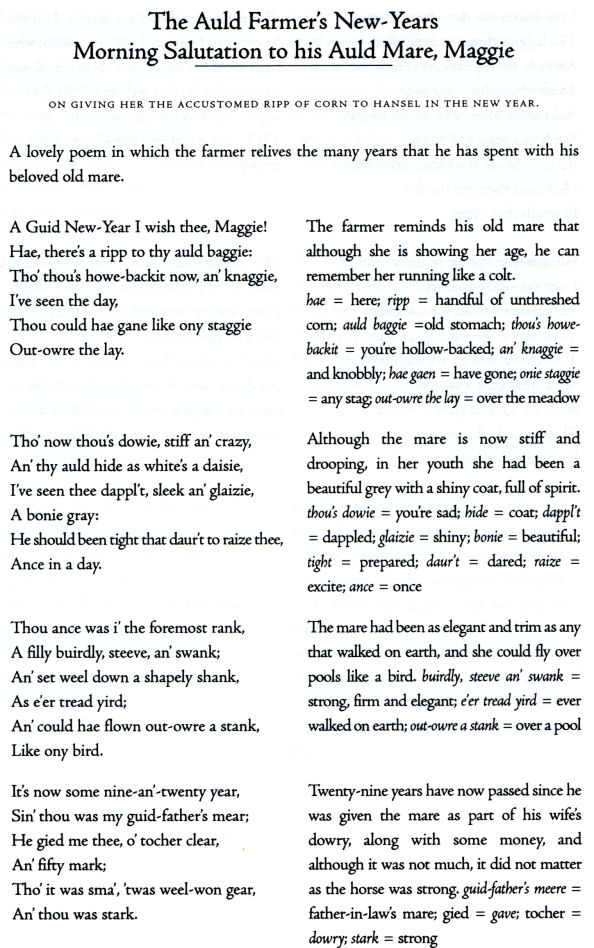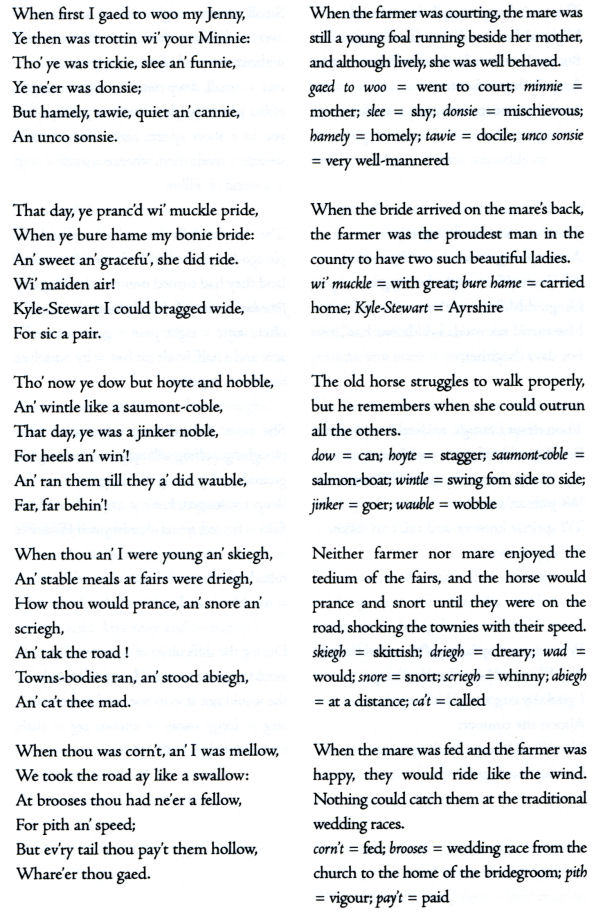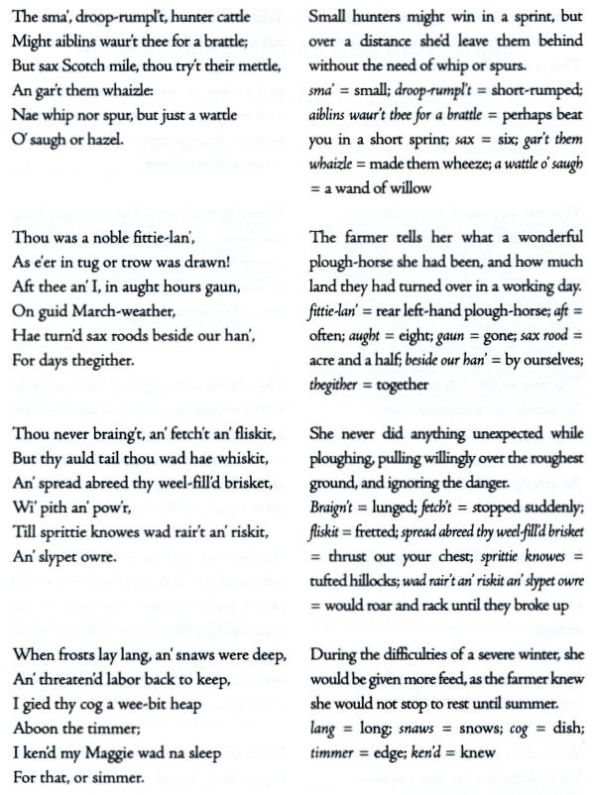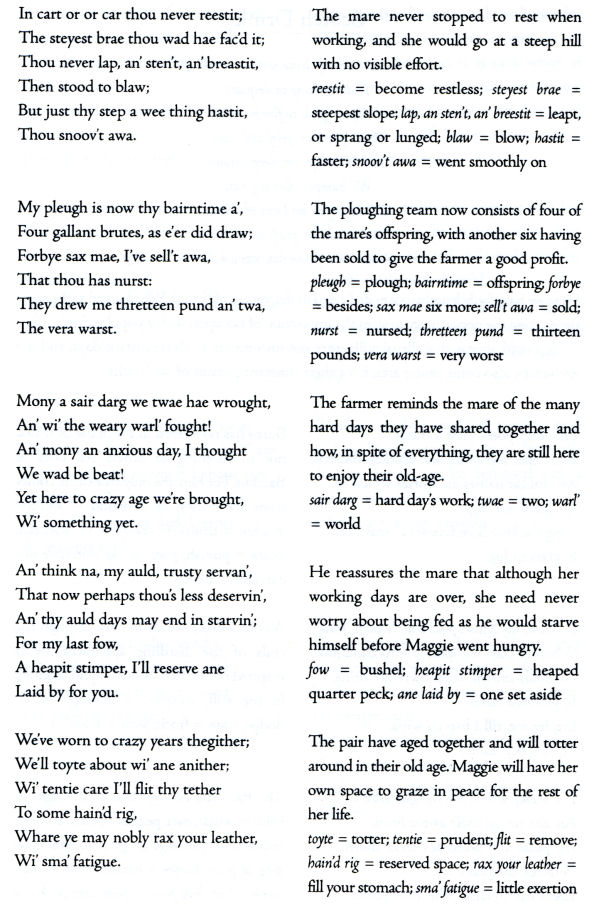|
Edited
by Frank R. Shaw, FSA Scot, Dawsonville, GA, USA
Email:
jurascot@earthlink.net
Alastair McIntyre, owner and
editor of
electricscotland.com, has submitted the following article to
grace the pages of our web site. Alastair is a most ingenious man and has
built a marvelous site concerning Scotland and the Scottish people. His work
on the internet has been called “a major educational resource about the
history of Scotland, Scots and Scots-Irish”. You will find that “Electric
Scotland is so huge until you are encouraged to avail yourself to our own
search engine to locate specific information”. Electric Scotland is the host
of Robert Burns Lives! so I was thrilled several weeks ago
when Alastair sent me an unsolicited article on Burns to post on our site if
I deemed it suitable. I am pleased to share his commentary about Burns being
better understood if his works were in English. You may agree or disagree.
Your call!
I have a book on this
subject entitled Burns Into English by William Kean Seymour who notes
that “Burns made use of more than twelve hundred dialect words which are
either peculiar to the Scottish Lowlands or have meanings distinct from
similar English forms”. It is no wonder that William Cowper wrote “his
candle is bright, but shut up in a dark lantern.” This is not an attack on
Burns, but reading his works is not easily done without a glossary at hand.
It is up to the individual to determine individually what is best for him or
her. The so-called “Burns Police” may not agree, but then it is not often
that I agree with them.
It is a joy to work with
Alastair McIntyre. He is a good “boss” who gives me the freedom to do my job
as I see fit, and for that I am grateful. It may sound odd to welcome our
owner but here is a big welcome to Alastair who raises some interesting
questions about Burns. I’m sure his article will raise a few “hackles” as
well. (FRS: 3.13.13)
How more Popular could Burns
be if translated into English?
By
Alastair McIntyre GOTJ, FSA Scot

While I am a Scot from as
far back as I can trace I was mostly brought up in Iran, Kuwait and Malta
and then attended boarding school at Dollar Academy in Scotland for some 7
years.
At that school I remember in
the English Class that we got the poem "Tam O' Shanter" which we had to
discuss and study.
At home in Scotland we did
have a complete book of Robert Burns with all his works. I don't however
remember it ever being opened until I started my Electric Scotland web site
when I decided to do a section on Robert Burns.
I tried to remember part of
"To a Mouse" as a kind of party piece. In fact I can still recite the first
verse.
To be frank that is about it
when it comes to Robert Burns although over the years I did attempt to read
a few other poems but the Scots language was a bit beyond me. That meant
that Burns was not a particular influence on me and while I recognised him
as a favourite Scottish Bard with a world wide reputation that was about it.
As I worked on the Burns
section for my web site I came across a lot of information about him and his
poetry which I was happy to make available on my web site for those that
were interested. You can see this section of the site at
http://www.electricscotland.com/burns
That all changed when I
received an email from George Wilkie about his new book "Understanding
Robert Burns".
Now if we take that poem "To
a Mouse" in George Wilkie's "Understanding Robert Burns" he starts...
On turning her up in her
nest, with the plough, November, 1785
We again see how, in the
words of Thomas Carlyl, the poet "rises to the high, stoops to the low, and
is brother and playmate to all nature." This is, by readers gentle and
readers simple, acknowledged to be one of the most perfect little gems that
ever human genius produced. One of its couplets has passed into a proverb:-
"The best laid schemes o' Mice an' Men, gang aft agley."
George Wilkie then says in
his book...
"Surely one of the finest
poems written by Burns, containing some of the most famous and memorable
lines ever written by a poet, yet, to this day not really understood by the
mass of English-speaking poetry lovers, for no other reason than that the
dialect causes it to be read as though in a foreign language. All readers of
Burns know of the "Wee sleekit cow'rin tim'rous beastie" but not many
understand the sadness and despair contained within the lines of this poem.
What was the Bard saying when he was inspired by turning up a fieldmouse in
her nest one day while out ploughing?"
He then goes on to explain
the poem to us in the format of displaying the origional poem verse by verse
then alongside each verse he adds his commentary. Here is how he deals with
the first two verses....
Wee, sleeket, cowran,
tim'rous beastie,
O, what panic's in thy breastie!
Thou need na start awa sae hasty,
Wi' bickering brattle!
I wad be laith to rin an' chase thee,
Wi' murd'ring pattle!
The poet is doing his utmost
to assure this terrified little creature that he has no intention of causing
it any harm. bickerin’ brattle = scurry, run; laith = loath; pattle = a
small spade for cleaning a plough.
I'm truly sorry Man's
dominion
Has broken Nature's social union,
An' justifies that ill opinion,
Which makes thee startle,
At me, thy poor, earth-born companion,
An' fellow-mortal!
He then goes on to apologise
to the mouse for the behaviour of mankind using beautiful prose which
requires neither translation nor interpretation. Listen to what he is
saying, and you will be well on your way to understand what made Burns such
a greatly loved man. Note how he equates himself with the mouse in life’s
great plan.
Working with Peter and
Marilyn Wright they recorded a number of Burns poems in the Scots language.
I might add that they are both exceptional Scots language speakers and can
carry on a conversation all day long in the language of Burns.
So with this explanation of
this poem you can also listen to the words spoken the way they are meant to
be spoken. See
http://www.electricscotland.com/burns/mouse.html
This is the 3rd most visited
page on my web site which contains tens of thousands of web pages.
In many respects George
Wilkie has actually made Burns more accessible to me personally.
I remember when in Sweden I
attempted to translate this poem to several Swedes who spoke excellent
English and failed miserably.
I want to tell you of one
other specific benefit this book had on me and that is to do with the poem
"The Auld Farmer's New-Years Morning Salutation to his Auld Mare, Maggie".
Now I have to say that this
is one poem I have tried to read many times and got no satisfaction from
trying to read it. In short I simply couldn't understand it. Neither did I
have any particular skill in reading it in the Scots language.
To illustrate this I want to
show you how George Wilkie dealt with it...




So what was to me an
incomprehensible poem turned into a charming poem which I've enjoyed ever
since.
You can read the book
"Understanding Robert Burns" at
http://www.electricscotland.com/burns/understanding_burns.htm
Now I am aware that the
Scots language is an emotional language whereas English is a technical
language. To try and illustrate this I worked for a number of years with
the Wrights in Scotland where Peter and Marilyn recorded many words,
phrases, verses and stories in the Scots language. As a result of this work
we have a huge section on the site full of real audio recordings. You can
see this at
http://www.electricscotland.com/culture/features/scots/index.htm
On that page the first
several sections...
Introduction
This is where you get an introduction to the Scots language.
Short Poems
We list wee snippets and articles for you to enjoy.
Idioms
Here we list some popular Scots idioms.
Sayings
Here we list some popular Scots sayings.
Complete Poems & Stories
Here we provide you with full length poems and stories.
Children's Poems & Stories
Here are some for the wee ones to enjoy.
Glossary
Here you will find a glossary of Scots words and their translations as well
as audio links so you can listen to the word being pronounced and used in
context.
Working again with the
Wrights on behalf of the Scots Independent Newspaper we produced a complete
Burns Supper in Real Audio which we donated to the Internet community. You
can listen to this at
http://www.electricscotland.com/culture/features/burns/index.htm
In the meantime I met Frank
Shaw then of Atlanta in Georgia who was a "Burnsian". Now at the time I
hadn't heard that term before but since become very familiar with. Here was
a person with a genuine love affair for the Bard and he wanted to share his
passion with anyone willing to listen and I was happy to listen.
Frank created his "Robert
Burns Lives!" series as he firmly believed that he still lives with us today
through his life and poetry and still has great meaning to people of today.
Over the years Frank has
produced some 165 articles (at time of writing this) about Robert Burns and
has shared through his friends all over the world many aspects of Robert
Burns. For a wee while he produced a mini series on "What Burns Means to Me"
written by various people such as Professor David Purdie, Dr. Carruthers,
Billy Kay, Eddi Reader, Dr. Kenneth Simpson, G. Ross Roy, and others.
He also tells stories such
as where he introduced a young daughter of a friend to Robert Burns and how
many years later she went to University to study Arts and Literature and how
she told him that it was his introduction to the Bard that set her on that
path.
All of Frank's efforts have
certainly made Robert Burns come more alive to me and you can read Frank's
articles at
http://www.electricscotland.com/familytree/frank/burns.htm
Now what does all this mean
to the man in the street?
For me it was being able to
understand Burns through the English language that made me appreciate his
worth. Without the work of people like George Wilkie, the Wrights and Frank
Shaw, I would still be very ignorant of his work and of his life.
I thus conjecture that a
greater effort should be made on educating us about Burns through the
English language. As you can see from the above I have made a particular
effort to educate people on the Scots language but it does take a lot of
time and effort to become familiar with it. I doubt the vast majority of
people, that would otherwise enjoy his works, will take the time to learn
it.
It's thus my opinion that we
need to do far more work on showing off his work in the English language so
that many more people can appreciate him. I have already shown how George
Wilkie turned an incomprehensible poem into one that I have really enjoyed.
Without that translation it would have remained an unappreciated poem. |

